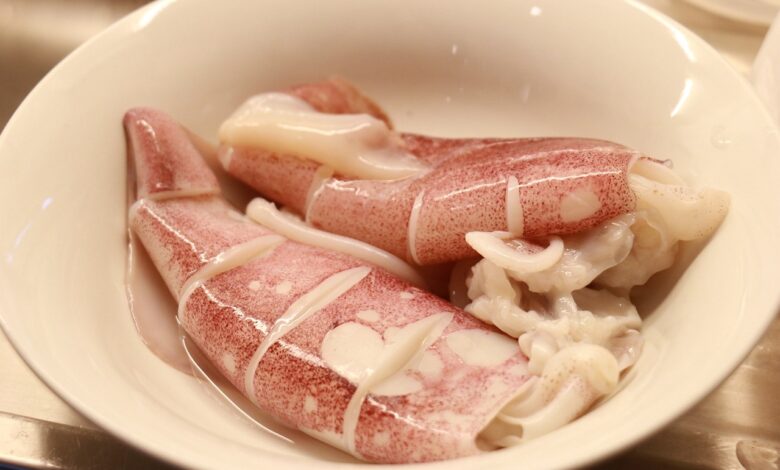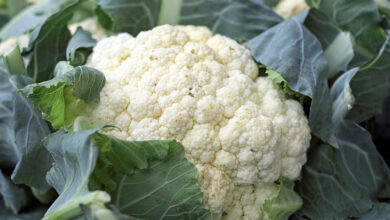Squid: Health Benefits And Side Effects

The squid has been known for cooking since ancient Greece. The Greeks called it “winged fish”. This, of course, is a metaphorical name: it does not fly, but it can jump out of the water. In fact, squids are invertebrate molluscs with tentacles.
Squids have a similar muscle structure, they are famous for their low calorie content, abundance of proteins, phosphorus, iron, iodine, potassium, sodium, polyunsaturated fats and vitamins (B1, B2, B6, B9, C, E, PP). Due to the fact that the mollusc has a beneficial effect on the cardiovascular, digestive, endocrine systems, modern healers call the squid “sea ginseng”.
Let’s figure out how the squid took its place among the useful delicacies and what are its benefits and harms.
The history Of Squid In Nutrition
Squids have been eaten since ancient Greece and Rome. Shellfish occupy a place of honour in Mediterranean cuisine. However, the Asian table is also happy with these guests – they are often used in Japanese dishes. If the Greeks and Italians subject the shellfish to heat treatment, the Japanese prefer fresh meat. Squid is a Mediterranean or Far Eastern product. They live mainly in the Adriatic, Japanese, Yellow Seas, as well as in the Pacific Ocean.
Squids can live in different layers of water bodies. Separately, the type of deep-sea squid stands out, they can reach 5-10 meters in length – you can’t cook these at home in a saucepan. In addition, their meat is quite tough, so small squids are eaten. The latter make up to 90% of the squid population on the planet.
Large squids are rare, and they have a special place not in the kitchen, but in literature and cinema. For example, in H. G. Wells’ fantasy story “Sea Pirates”, giant squid attacked people. In reality, deep-sea squids are harmless and feed on small fish and crustaceans.
The Benefits Of Squid
Squids are high in protein, minerals and low in calories. Low-calorie squid is great for those who want to increase their protein intake without sacrificing their figure. A 100-gram serving of squid contains only 75-85 kcal.
These shellfish are a source of vitamins B12 and B6. The body needs vitamin B12 for nerve and blood health, and vitamin B6 to protect the heart from strokes. Squid contains selenium and vitamin E.
Like most shellfish, squid also contain high amounts of dietary cholesterol. Despite this, eating squid will not harm the body, if you follow the measure. The fact is that only 15% of cholesterol enters our body with food. The rest is produced in the liver. Its increased production is stimulated by a constant daily intake of saturated and trans fats, and not cholesterol from food. And there is very little fat in squid. The beneficial properties of squid do not end there.
Squids are a source of iron. They can provide approximately 90% of copper, which is a mineral needed for the absorption, storage and metabolism of iron. The copper found in squid also plays an important role in the formation of red blood cells. Copper deficiency can be seen in anemia.
In addition, eating squid is good for the health of hair and nails, teeth and bones. Like shrimp and fish, squid is full of protein and the mineral phosphorus, which helps calcium build teeth and bones and strengthen hair and nails.
So, squid is useful in that:
- Contains a lot of protein necessary for the body,
- Is a source of B vitamins, vitamin E and selenium,
- Is easier and easier to digest than dietary chicken breast – therefore it is recommended by nutritionists,
- Useful for the composition of human blood, as it contains iron,
- Useful for hair, nails, teeth, bones due to calcium.
The Side Effects Of Squid
When using seafood, it is worth remembering about safety measures. It is best to buy a cleaned frozen squid carcass with a small percentage of glaze (frozen water and mucus), no more than 5% – this is a guarantee of product quality. But even such a squid is not recommended to be consumed raw – it should be boiled in boiling water for 5-10 minutes to remove possible bacteria. Processing squid in the form of deep and quick freezing and the subsequent heat treatment together reduce the risk of ingestion of accidental marine parasites into the human body.
To avoid unpleasant episodes of food poisoning associated with eating spoiled seafood, eat them fresh. Like all shellfish, squid quickly deteriorate and are susceptible to bacterial contamination. You need to either eat them fresh (catch on the same day), or store them correctly and for a short time at a temperature of 0-5 degrees.
If you love squid in Japanese cuisine, i.e. fresh in dishes such as sushi or sashimi, it is recommended to choose reliable restaurants or seafood suppliers who deliver them in the shortest possible time without violating storage and transportation conditions.
Squid can cause an allergic reaction. With individual intolerance, you can not eat them. In addition, as mentioned above, squid contain cholesterol, so you should not abuse shellfish in your diet – this can provoke an increase in cholesterol levels in the body.




